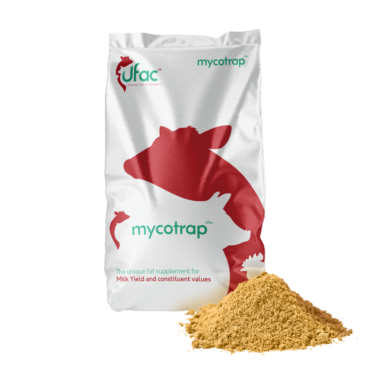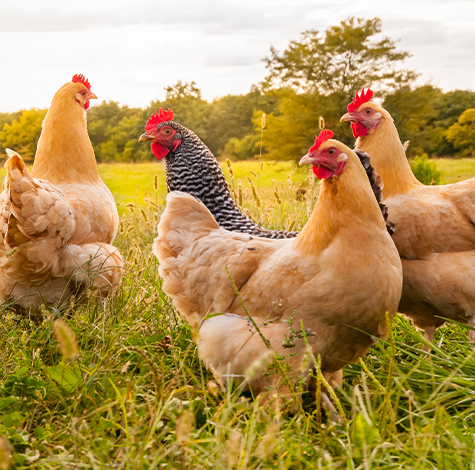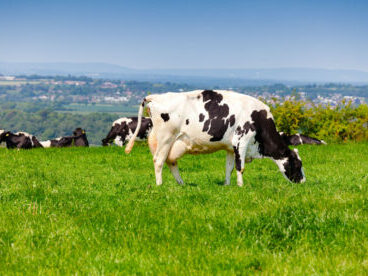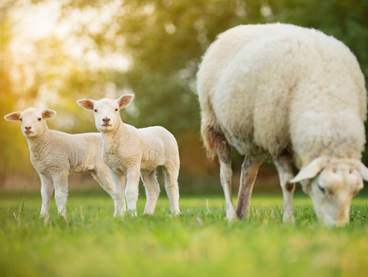In an age of climate crisis, find out how UFAC’s non-digestible mycotoxin binder, mycotrap, can provide protection against mycotoxins, support fertility and improve the overall health status of livestock.
As a country, we depend on supplementing our home-grown raw materials with imported ones. We therefore need to be aware of ever-changing weather patterns around the world and the impact that this has on the mycotoxin levels of the raw materials we import and feed to our livestock.
This summer’s extreme weather patterns will have caused stress to the growing and developing crops. This makes for an ideal breeding ground for mycotoxins and mould.
What are Mycotoxins?
Mycotoxins are toxic chemicals produced by fungi that readily colonise crops in the field and in storage. The amount and type of mycotoxin produced depends on the mould present during different environmental conditions. Influencing factors include drought, rainfall, hot or cool temperatures and pests. This summer’s increased temperatures will mean an overall increase in mycotoxigenic fungi suited to higher temperatures, such as the aflatoxin-producing Aspergillus species, impacting the liver, immune and reproductive systems.
Effects of Mycotoxins on livestock
Mycotoxins affect multiple body systems and organs, including the immune system, making it easier for bacterial infections and diseases to occur. Even at very low levels, they are extremely harmful to ruminants and monogastrics. Symptoms of mycotoxins include;
- Reduced feed consumption and feed conversion
- Increased mastitis
- Reduced resistance to disease
- Reproductive issues
- Reduced performance and production
- Intestinal haemorrhages
- Compromised immune system
Signs to look out for
It’s important to identify and treat symptoms as early as possible to avoid diseases in livestock. Mycotoxins are one of the most dangerous hidden threats to livestock health. Impacting growth, fertility, disease immunity and overall performance.
Symptoms of exposure
- Reduced milk exposure
- Impaired rumen function
- Poor growth/ reduced body weight
- reproductive / fertility problems
- Immune suppression
- Mucous tags
- Impaired udder health
- Increased somatic cell counts

What is mycotrap?
mycotrap is a cost-effective, independently tested broad spectrum mycotoxin binder for all classes of livestock. It has proven effective performance in minimising the levels of mycotoxins throughout the entire gastro-intestinal tract.
Mycotrap is a non-digestible, free-flowing and palatable product which is easily incorporated into feed. The clay compound binds with mycotoxins in the gut and guides them through the digestive tract.
mycotrap incorporates specific activated clay minerals with added glucose pre-cursor, glycerine to provide enhanced toxin control and improved liver function.
This specialised clay mineral compound has been independently tested at Gent University, Belgium. It is proven to have a strong binding capacity for a broad range of economically damaging mycotoxins at all pH ranges found throughout the entire gastrointestinal tract.
The University of Ghent’s research
The University of Ghent is a leading centre of mycotoxin research. They tested and reported the efficiency of mycotrap on a broad spectrum of mycotoxins at a wide range of pH levels.
The study used a two-phase method, simulating the digestive tract’s pH range. The method proved mycotrap to be effective in adsorbing a wider range of mycotoxins in the acidic conditions in the stomach, near neutral pH milieu of the small intestine and alkaline environment of the hindgut than other products.
As a result of the study, it was found that the mycotrap binder supplement has a string binding capacity for certain mycotoxins. This means that mycotrap can be easily incorporated into livestock feed to guide mycotoxins through the digestive tract and help avoid illnesses and symptoms in livestock.
The study also showed that mycotrap can increase milk production, egg production, hatchability, conception rates, and more.
Interested in learning more about mycotrap, fill out the form below, and a member of our team will be in touch with more information, or contact our Regional Business Managers directly.
Mark Townsend
M: 07788 294 539
South West and Wales
Richard Lapthorne
M: 07788 963 487
North England and Scotland
James Hastings-Molyneux
M: 07538 763 832
South East and Mildlands


 Back to News
Back to News 



